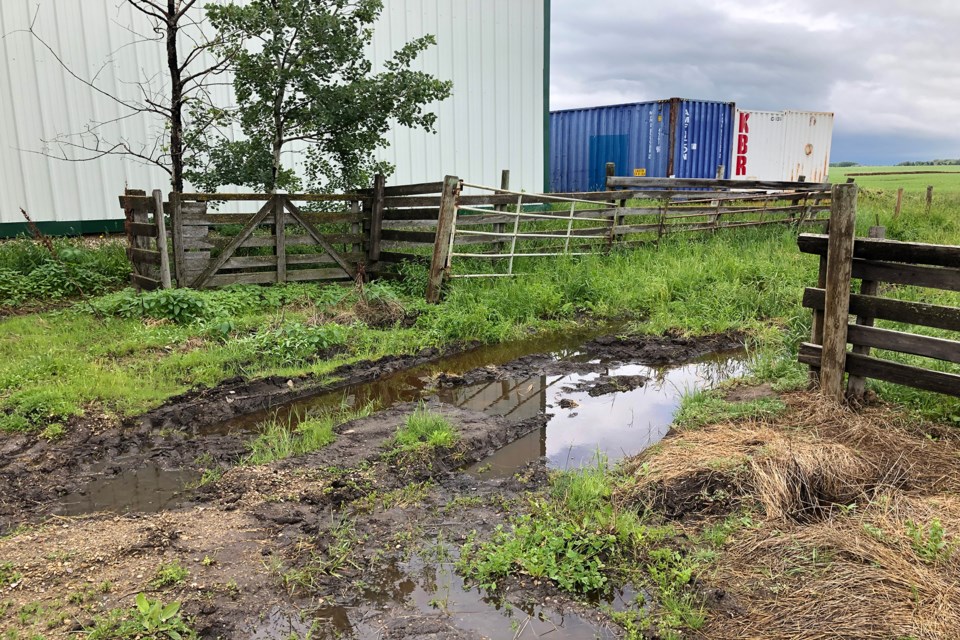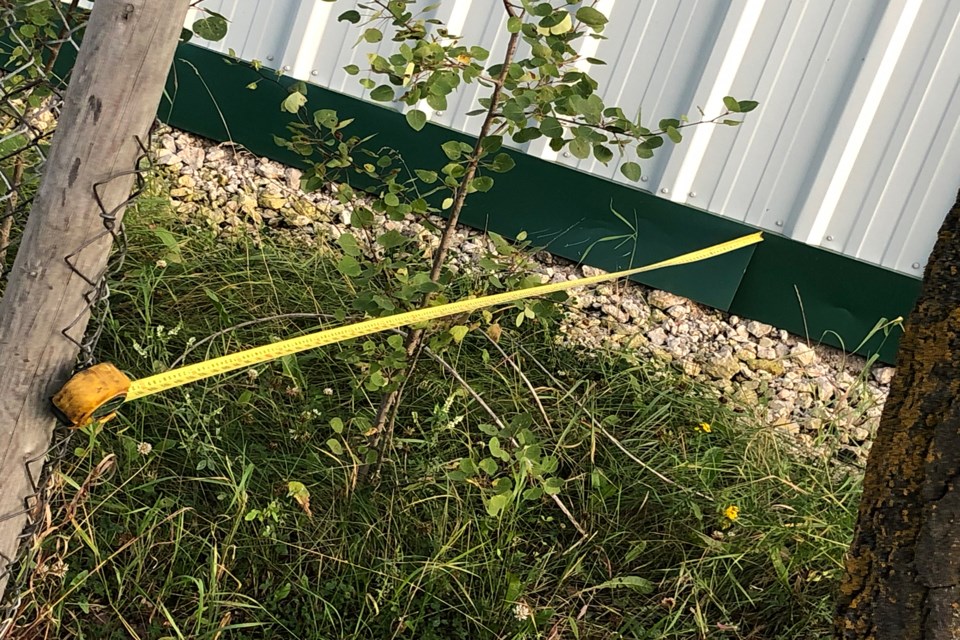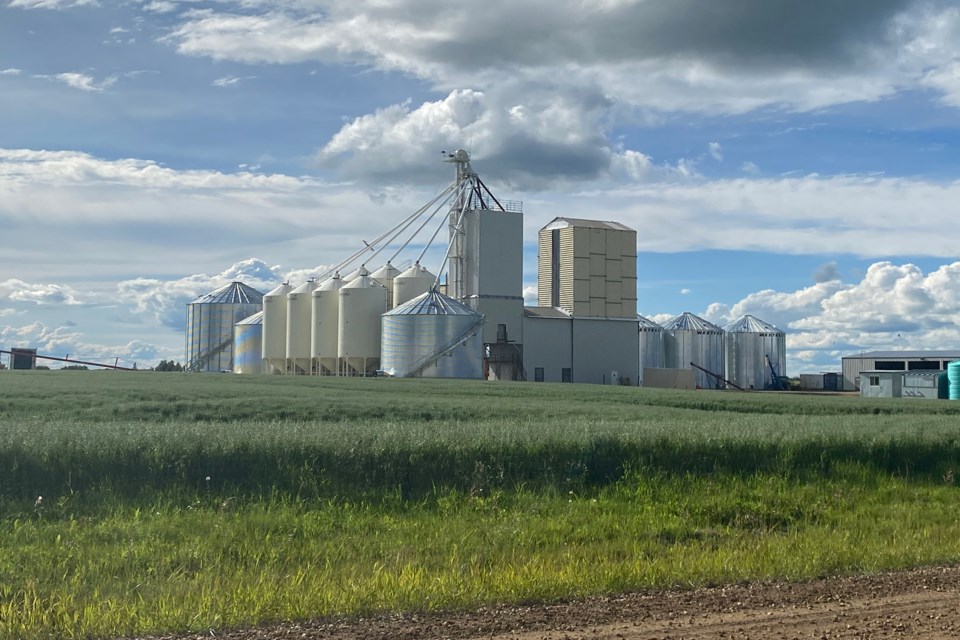WESTLOCK — In June, a farming operation east of Westlock was allowed to proceed with its operations after a Subdivision and Development Appeal Board hearing.
Jonk Farms was served two orders from Westlock County, asking that they stop their grain handling and seed cleaning operation. The Jonks appealed the decision and won June 30. The county acknowledged SDAB’s resolution and decided not to pursue the case further.
While the two parties have agreed to “work cooperatively” in the future, as Theo Jonk, one of the farm operators, put it then, the case still isn’t closed. Norm Mercier, the Jonks’ neighbour, is suing both the farmers and the county over the same facilities.
Mercier is claiming that the facility, which is right next to his house, has devalued his property. According to land appraisal documents Mercier showed TC Staff, between 2010 and 2019, his property value dropped by 43 per cent.
“A seed cleaning plant is located directly to the south (adjacent to this plant),” the document reads. “Looked at property. Reduced for location … seed plant next door.”
To rehash the timeline: in 2014, the Jonks applied for a development permit to build a grain handling facility; in May 2015, the county issued a stop order to the Jonks because they started construction without a permit; the Jonks offered more information about what they were doing and in July 2015, the county refused their development application; the Jonks then appealed and SDAB granted the Jonks the development permit.
There was another stop work order in October 2019, when the county claimed the Jonks were using their grain handling for commercial operations, which wasn’t allowed under their existing development permit. The order was dismissed that same month by Municipal Affairs, on account of the Jonks’ submission that they’re not allowing public access to the building.
An assessment for the 2018 tax year claimed that the Jonks owed $27,567.55 in taxes in 2019; their lands were classified as industrial as opposed to farm, which led to the $26,000 increase from the previous year. The county assessor met with Theo Jonk Jan. 24, and made a recommendation to adjust the rate to $3,986.84, for an 80 per cent farming, 20 per cent commercial split.
Lastly, in May, the county issued two stop orders for seed cleaning and grain handling facilities, claiming that they were doing commercial grain handling and that a building permit was required for the seed cleaning plant. The Jonks successfully appealed June 30.
At that hearing, the Jonks claimed this timeline showed a “history of abuse” on the part of Westlock County, a claim which Theo Jonk didn’t want to discuss further after SDAB decided to dismiss those stop orders.
But Mercier’s position is very different: “I have been abused!” he said July 28.
Mercier showed TC Staff around his property that day. He explained that he made plans to do some upgrades on the property but given the continuous depreciation of his property value because of the facilities right next door to him, he doesn’t see the use.
He used to keep cattle on his five acres, which he’s since moved elsewhere because of ongoing flooding. The Jonks’ shop is only nine feet away from his fence, and Mercier claims they raised the level before putting it in, causing his property to flood—he’s provided numerous photographs.
 One of several images of flooding on Mercier's property. He used to keep cattle there, but had to relocate them because of the water. Supplied
One of several images of flooding on Mercier's property. He used to keep cattle there, but had to relocate them because of the water. SuppliedHealth issues, both his and his son’s, have intensified over the last five years as well.
The Jonks continue to claim that they handle their own grain only and there’s no seed cleaning currently occurring on their property. They clean their seed at the Westlock Seed Cleaning Co-Op, they say.
Mercier is claiming otherwise. He wouldn’t comment on the record; instead, he said he wanted the facts, most of which can be found in the SDAB hearing documents.
When viewed from an administrative perspective, the timeline that the Jonks offered as proof of a “history of abuse” reads more like enforcing existing bylaws. In 2014, the Jonks began construction before obtaining a permit. What they received was a “preliminary notice of decision” that their application would be approved provided it’s in compliance with land use bylaws.
There’s a gap in the timeline, between Nov. 5, 2014 when the notice was given and May 29, 2015 when the county issued a stop work order. In those months, both parties could have clarified the state of that original application—the county could’ve denied it for the same reasons it provided at the SDAB hearing in 2015, or the Jonks could’ve inquired.
But it seems the Jonks took the preliminary notice as a permit approval—they stated they received a permit Nov. 5, 2014.
According to the county, the quarter where the Jonks chose to build the facility was zoned as a controlled urban district; only activities required to grow agricultural products, not process them, are allowed there.
Whether or not commercial activity is occurring on the property is also less of a mystery in the documents. The joint submission, in January 2020, from the assessor and the Jonks revealed that 20 per cent of the operation is commercial in nature.
It’s worth noting that there’s not enough clarity in these documents to understand what ‘commercial’ refers to—whether it’s the purchase of grain from other farmers for the purposes of resale/export, or whether the Jonks charge paying customers fees to process their grain.
Either way, the Jonks claim they only buy grain from other farmers to supplement poor crop yields. Different permits are needed for commercial operations, and the Jonks don’t have them.
As for the seed cleaning plant, the Jonks continue to say they are not doing that on their property. Except that’s not to say seed cleaning equipment doesn’t exist there, or that they don’t intend to have it operational.
In the 2014 development permit application, Nick Jonk wrote that “with this development plan we intent to handle our own grain, with grain cleaning equipment to be installed in the future. 700 (bushels per hour) cleaner.”
After a meeting with the Jonks in 2018, the county’s development authority wrote back: “As discussed today, it was clear that the existing grain handling facility has evolved into a seed cleaning plant.” She acknowledged this appeared in the permit application and advised the Jonks to apply for the appropriate permits.
“The important part of this process is to advise or confirm to our office if there is any thought or idea to one day seed clean and export for other area farmers,” she wrote.
Since then, there have been two inspections done on the property, one in September 2019, when inspectors confirmed that “a seed cleaning has since been constructed,” and another in October 2019: “Nick Jonk … is constructing a new on-farm seed plant,” wrote the engineer who conducted the area classification analysis for the new facility.
So while they might deny they’re not cleaning seed right now, the two reports confirm that there is seed cleaning equipment on the property.
The county and their legal counsel denied comment since this is currently before the courts.
As for Mercier, his hearing is scheduled this fall. Ultimately, the only issue for him is where this seed cleaning plant and grain handling facility are located. He’s even disputing the distance from his property line to the plant; it’s not regulation, he says.
Meanwhile, his friends have seen this take a toll on him for five years. He went to that hearing in 2015 and told SDAB he was worried about property depreciation—so did another landowner. And the fact today remains that his property is worth half of what it used to be.
 The distance from Norm Mercier's fence to a farm shop his neighbours built is only nine feet. He's claiming the raised platform has been causing flooding on his land. Supplied
The distance from Norm Mercier's fence to a farm shop his neighbours built is only nine feet. He's claiming the raised platform has been causing flooding on his land. Supplied


